Dutch Bicycling Guidelines
Top 6 Suggestions
Be predictable
1Nothing can get you into trouble more than making last minute maneuvers that other cyclists can't anticipate. Never stop suddenly along a busy bike lane to check your map or look at the scenery. Local cyclists do not have patience for tourists blocking their roadway and they will let you know it. Simply move over to the far right and out of the traffic lane if you must stop.
It is normal to feel intimidated at first. Just remember to stay to the right at all times and be aware of people coming up behind you or merging at an intersection. They will take care of themselves, so relax, observe, and take care of yourself.
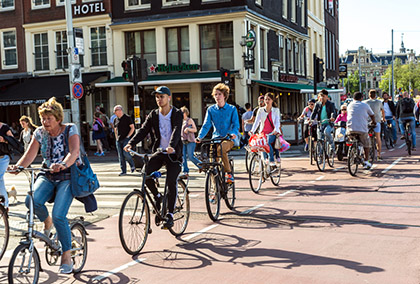
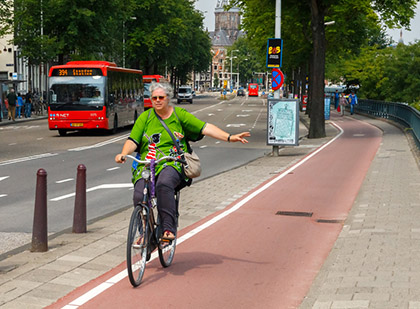
Always use hand signals!
2Forget about the hand signals you were taught in your automobile drivers test. They do not apply here and you will look very foolish if attempting to use them. Quite simply, raise your left or right arm to about a 30 - 45 degree angle for a brief moment to indicate which direction you are going.
Other cyclists need to know your intentions and you need to know theirs, so always be observant and use your left and right hand signals when it's appropriate. It's a courtesy that will become second nature to you as it takes so little effort.
Don't panic in a crowd. Be confident
3OK, so you have arrived in Amsterdam and have met your fears and are now ready to try riding with the masses... good for you! The first step is to observe how bicyclists interact with one another. It is very subtle, but notice the simple hand signals and merging techniques they use.
You may not think people are paying attention, but believe us... they are very aware, especially if you are acting irresponsibly by not paying attention. Save the recreational bicycling for the countryside. Once you get the hang of it you will soon feel like a local.
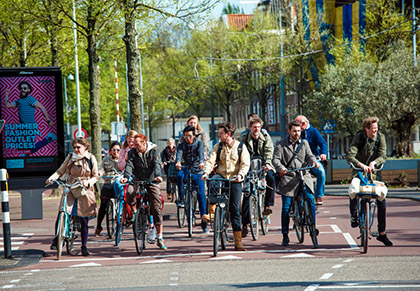
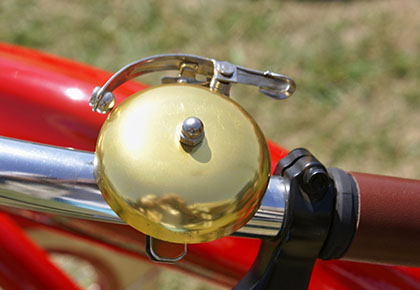
Use your bell when passing
4A bell is a critical component to have on your bicycle and must be used when passing someone who is blocking the left lane. Never ever yell out, which is considered rude and threatening. A simple "Ding" "Ding" is all it takes when alerting someone to get over and allow you to pass.
Handlebar real estate is so precious to most bicyclists because there is so little of it to spare. This is one item that needs to find a home there at all costs. Did we mention that it is required by law and you can be fined? (...and they do!)
Understanding right of way
5If you are to remember one thing, understand the "Sharks Teeth" that are painted on the road and bike path. They are the white diamonds that indicate who has right of way at a crossing.
Here's how it works. If the teeth are pointed at you then you must stop or yield. Sharks Teeth always point at the person who must yield and never the other way around. This knowledge becomes critical in a roundabout situation. When a bicycle path and a roadway intersect, typically the bike path takes priority, but not always! It's important that you read the other guy's shark teeth to ensure they must stop.
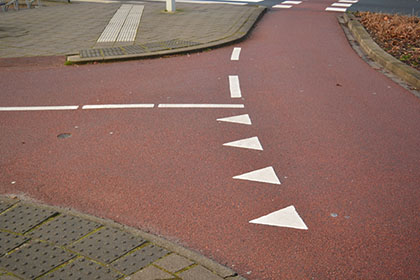
Here is an excellent video that clearly demonstrates how it all works...
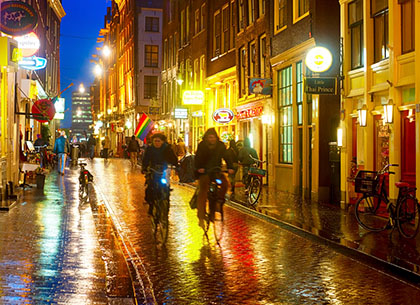
Bike Lights
6Front and rear lights are not only mandatory by law, they are essential to have for riding home at night after an evening out.
They will also come in handy when you have a repair issue along the way. That flat tire could cost you vital sunlight time and require you to ride home in the dark.
If your bike doesn't already have lights, there are many options readily available from local bike shops.
Check out this LIVE feed camera of a local roundabout.
See how cars and bikes coexist by using the Sharks Teeth.
Before you go...
North American
Time Zone Offsets
Atlantic:
Eastern:
Central:
Mountain:
Pacific:
Hawaii:
+5 hours
+6 hours
+7 hours
+8 Hours
+9 hours
+11 hours
The Netherlands is on Central European Time
Allow a moment for the camera to respond...
Located in the town of Purmerend in North Holland
KING THOMAS © 2022 | NETHERLANDS BY BIKE | ABOUT US